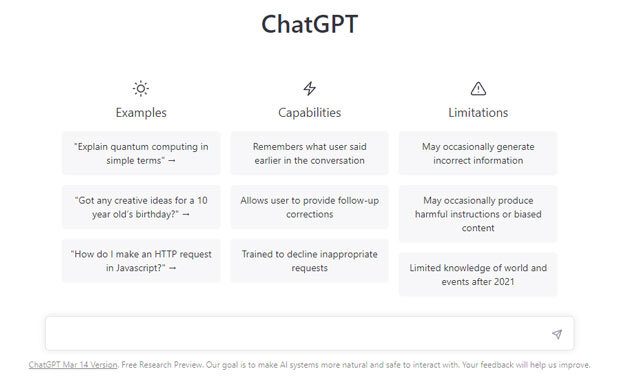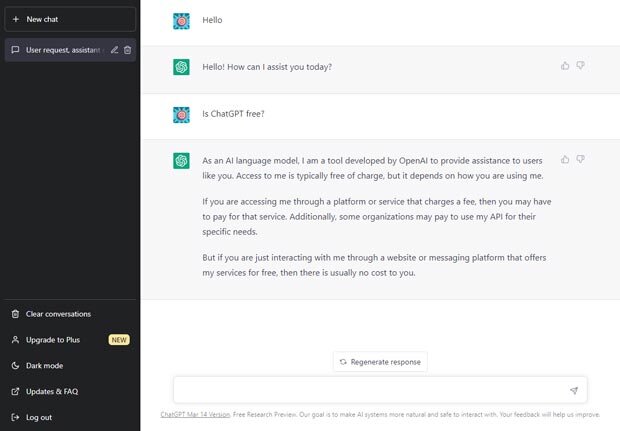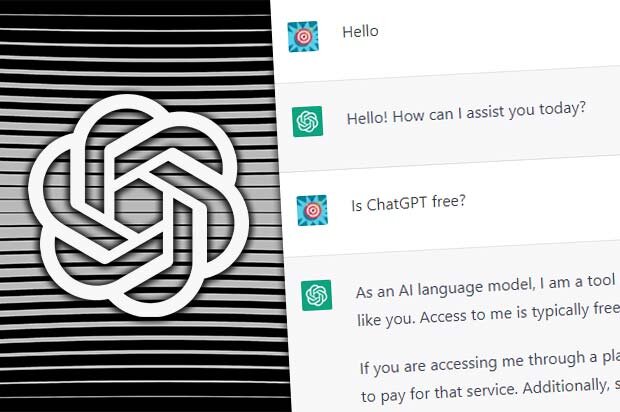Iran (IMNA) - ChatGPT is an advanced language processing tool created by OpenAI that uses deep learning algorithms to understand natural language and generate human-like responses to a wide variety of queries. It is built on top of OpenAI's GPT-3.5 and GPT-4 families of large language models, which allows it to analyze and understand the context of a given query and generate responses that are relevant and accurate. ChatGPT has been trained on a vast amount of text data from various sources, including books, articles, and websites, which has enabled it to develop a rich knowledge base on a broad range of topics. As a result, Chat GPT can help users find information, answer questions, or engage in conversation, all in a natural language format.
How ChatGPT Can Help Businesses?
As an AI language model, ChatGPT can help businesses in various ways, such as:
- Customer Service: ChatGPT can be used to create chatbots that can provide instant customer service to users. This can help businesses to reduce the response time and handle more customer queries at the same time. ChatGPT can understand natural language queries and provide relevant answers to users, thus improving the overall customer experience.
- Personalization: ChatGPT can be used to analyze customer data and create personalized recommendations for each individual customer. By understanding the customer's preferences, Chat GPT can help businesses tailor their offerings to the customer's needs and preferences, increasing customer satisfaction.
- Content Creation: ChatGPT can be used to generate content for businesses, such as blog posts, product descriptions, and marketing copy. This can save businesses time and resources by automating content creation, while also ensuring that the content is engaging and relevant to the target audience.
- Sentiment Analysis: ChatGPT can be used to analyze customer feedback and reviews, providing businesses with valuable insights into how customers feel about their products or services. This can help businesses to identify areas for improvement and make changes to their offerings accordingly.
- Language Translation: ChatGPT can be used to translate content into different languages, enabling businesses to expand their reach and target customers in new markets. This can help businesses to break down language barriers and increase their global presence.
Overall, Chat GPT can be an incredibly valuable tool for businesses, helping them to improve customer service, personalize offerings, create engaging content, gain insights into customer sentiment, and expand their global reach.

How To Use ChatGPT?
ChatGPT is an AI-based chatbot that has been trained using large amounts of data and advanced machine learning algorithms to respond to user inputs in natural language. Here is a brief summary of how to use ChatGPT. As a user, you can engage in a conversation with ChatGPT by typing in your questions or comments, and ChatGPT will generate a response based on its understanding of the language and context of your input.
To use ChatGPT effectively, it's recommended that you frame your questions or comments in a clear and concise manner, and provide as much detail and context as possible. This will help ChatGPT to better understand your input and provide a more accurate and helpful response.
It's important to note that while ChatGPT is designed to simulate human-like conversation, it's still a machine-learning model and may not always provide accurate or reliable information. Therefore, it's always a good idea to verify any information you receive from ChatGPT with additional sources, particularly if the information is critical or has significant consequences.
Where Does ChatGPT Get its Data?
ChatGPT is a machine learning model that has been trained on a massive dataset of text data. This dataset has been collected from various sources such as books, articles, academic papers, websites, and other online resources. The dataset has been carefully curated to ensure that it is diverse and representative of natural language.
To train ChatGPT, the dataset was fed into the model's deep learning algorithms, which enabled it to learn the patterns and structures of language. During the training process, the model analyzed the text data and used it to generate predictions about the next word or sequence of words in a sentence.
As ChatGPT was exposed to more and more text data, it became better at generating coherent and relevant responses to various prompts. The model has been fine-tuned on different tasks such as language translation, question answering, and chatbot conversation, to further enhance its language abilities.
Overall, Chat GPT has been trained on a large and diverse dataset of text data using sophisticated machine learning algorithms, which has enabled it to become a highly capable language model that can understand and generate human-like language.

Who owns ChatGPT?
ChatGPT is an artificial intelligence language model developed by OpenAI, which is a privately held AI research laboratory consisting of the for-profit corporation OpenAI LP and its parent company, the non-profit OpenAI Inc. The company was founded by several high-profile tech industry figures, including Elon Musk and Sam Altman, but Elon Musk left the board in 2018 due to conflicts of interest.
What Are The Best ChatGPT Alternatives?
There are several ChatGPT alternatives that are worth considering depending on your specific needs. Some of the best ChatGPT alternatives include:
- Chatsonic: This is considered one of the best ChatGPT alternatives by many. It was created by Writesonic and can answer most questions asked of it.
- Bing AI Chat: Bing AI Chat or Microsoft's AI-powered Bing is the closest to ChatGPT you can get anywhere on the web. It provides a range of conversational abilities and can handle general-purpose tasks along with providing answers to user queries.
- Google Bard AI: This is an AI-powered chatbot created by Google that can be used as an alternative to ChatGPT. It has powerful natural language processing capabilities and can generate human-like responses.
- YouChat: YouChat is an AI-powered platform that focuses on chatbot-based human interactions. It can be trained to recognize users' interests and hobbies, as well as generate content tailored to individual preferences.
- Jasper Chat: Formerly known as Jarvis, Jasper is an AI writing software tool that is a decent alternative to ChatGPT. It is based on GPT 3.5, among other language models, and has a partnership with OpenAI.
- Socratic by Google: Socratic by Google is an AI-driven learning app designed to help high school and university students with their homework questions. Powered by Google's artificial intelligence technology, Socratic enables users to ask questions using voice or text input and receive step-by-step explanations, hints, and videos to help them understand the concept better. The app is designed to help students with subjects such as math, science, and history and is used by both teachers and students.
In summary, these ChatGPT alternatives vary in terms of features, functionality, and specific use cases. Still, each offers a unique approach to conversational AI that can be adapted to different needs.


Your Comment